13th Annual Conference of Human Dignity and Humiliation Studies
"World Peace Through Humiliation-Free Global Human Interactions"
in Honolulu, Hawai'i,
20th – 22th August 2009
See here:
• A condensed program of this conference in pdf format
• Newsletter 13 written after this conference
• A Photo Album of the Conference made by Linda Hartling
• Short videos of Day One and of Day Two by Stephanie Heuer
• Long video-documentation by Rick Slaven upcoming
Local Host, Organizer, and Convener
Dharm P. S. Bhawuk, Professor of Management and Culture and Community Psychology,
Shidler College of Business,
University of Hawai'i, Manoa, Honolulu
A big thank-you to you, dear Bhawuk!
Venue: Shidler College of Business, rooms D 101 and D 102, University of Hawai'i, Manoa 2404 Maile Way Honolulu, HI 96822 (see directions and map)
• Pictures
• Frame
• List of Conveners
• Program
• List of Participants
• Papers
• What happens in our conferences? Please see Newsletters!
Pictures
See a Photo Album of all of the Conference, in Pdf format for downloading, made by Linda Hartling. Thank you, dear Linda!
|
|---|
Day One, 20th August 2009 |
 |
| From Evelin's camera Please click on the picture above or here to see more photos! Please see here the video of Day One taped by Stephanie Heuer |
   |
| From Linda's camera The venue of our conference - Shidler College of Business (conference venue) and Abraham Lincoln Hall (where many of us stayed) Please click on the picture above or here to see more photos! |
|
From Evelin's camera |
 |
| From Linda's camera Our 13th Annual HumanDHS conference was unique in that it took place in a "nation within" or in a nation that was incorporated into another nation against its will. We watched the deeply troubling film Nation Within on the eve of the 21st August. The 21st of August 2009 (Day Two of our conference) marked the fiftieth anniversary of President Dwight D. Eisenhower signing the Proclamation for Hawai'i to become a State of the United States. This is a controversial anniversary, because the native Hawai'ians consider the annexation an illegal overthrow of their monarchy. This is another example of anniversary celebrations being perceived as profoundly humiliating by those who were disenfranchized. Please see for more information, among others, Hawai'i Pono'ī -The People Who Love the Land. Through Kristabelle Munson, we had the unexpected privilege of witnessing the solemn chanting marking the date of this humiliation, and meeting with Yuklin Aluli, Attorney at Law, and Kau'i N. Burgess, both part of the Hawai'i Pono'ī Coalition. On their website we read: "Hawai'i Pono'ī is the title of the Hawai'i national anthem written by King Kalākauwa in 1874. Literally translated "Hawai'i's own," Hawai'i Pono'ī connects us to the history of the Islands and the heritage of its Indigenous people, a heritage that enriches us all. The Hawai'i Pono'ī Coalition was formed to educate those who live in and visit the Islands about Hawai'i's true history, the Native Hawai'ian people, and the culture that makes Hawai'i a place like no other. Kristabelle also made us aware of the Hawai'ian renaissance and of singers such as Gabby Pahinui. See here the lyrics of a song that expresses feelings of sadness at modern alienation, entitled Hawai'i 78 (77) by Israel Kamakawiwo Ole' (Pdf); see also https://youtu.be/5ZOAiSP1MGs. 2014: • "Most people would say that the United States of America has 50 states, and that Hawai'i is one of them. But Hawaiian academic Dr. Keanu Sai says otherwise. Sai says that Hawai'i was never legally annexed to the United States, and has been illegally occupied for the past 121 years," "Dr. Sai interviewed on The Wire in Aotearoa," Hawaiian Kingdom Independence Blog, Hawaii… an independent country under prolonged illegal occupation, 30th September, 2014. • "Hawaiian Sovereignty & International Law by David Keanu Sai Ph.D.," published on 9 Jan 2014. • The sovereignty of Hawai'i: A quote from senior Law Professor Chang: "The power of the United States, over the Hawaiian islands, and the jurisdiction of the United States in the State of Hawai'i, by its own admissions, by its own laws, doesn't exist. And so that means that ever since the 1898 annexation of Hawai'i, by a Joint Resolution, they say, we have been living a myth." (3:01 min/sec.)." • Sai, David Keanu (2008). American Occupation of the Hawaiian Kingdom: Beginning the Transition from Occupied to Restored State. Manoa, HI: University of Hawai`i at Manoa, Political Science, doctoral dissertation. Please click on the picture above or here to see more photos! |
|
 |
| From Evelin's camera Please click on the picture above or here to see more photos! |
Day Four, 23rd August 2009, excursion into O'ahu, led by Kristabelle Munson, with Linda and Rick, Safa, Victoria, Grace, Werner, and Evelin |
| From Evelin's camera Dear Kristabelle gifted leis from Aunty Dora to us! Dear Kristabelle gifted leis from Aunty Dora to us! Lei making has an immediate association with Aloha, and a bona fide importance in Hawai'i's culture. In the inflight magazine of Go! (styled as go!), a regional brand of Mesa Airlines based in Honolulu, Hawai'i, Aunty Dora is featured: "Aunty Dora is one of the many lei fabricators still stringing together Aloha, and has been for past 74 year. Question to her: What is your name, what do you do and how are you preserving our culture? She replies: I'am 88 years old and make leis. I've been selling leis since I was 14 at the Aloha Tower; from there we had a lei stand at the Keehi (Lagoon) Park. Then they moved us inside the airport and now we are here. Question: How do you define Aloha, and why does it play such an important role? Answer: Aloha means a lot of things, usually Hello, Good-bye, and Love. Question: What is your favorita thing about living in Hawai'i (restaurants, shopping, bars, recreational activities)? Answer: Oh! I've been here my whole life! I just stay here at the lei stand now. I like the weather. Question: When you think of Hawai'i, what song comes to mind? Answer: Beautiful Kauai. Question: Do you have any words of wisdom? Answer: Lei making will never be replaced by machines, they've tried, but it didn't work" (Kama'aina: nvi, native born, born in a place, host.) Please click on the first picture above or here to see more photos of our excursion, and click on Aunty Dora's pictures to see them larger! |
 |
| From Evelin's camera Please click on the picture above or here to see more photos! |
 |
| From Linda's camera Please click on the picture above or here to see more photos! |
|
 |
| From Linda's camera Please click on the picture above or here to see more photos! |
Day Seven, 26th August 2009, exploring O'ahu, Linda, Rick, and Evelin |
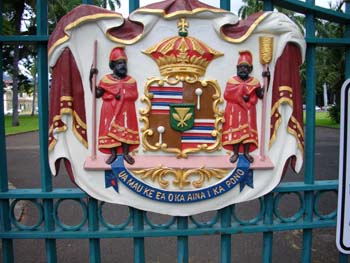 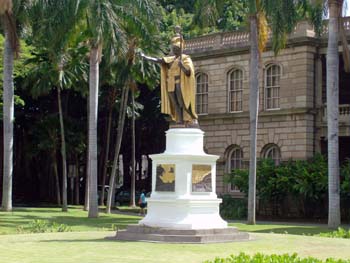 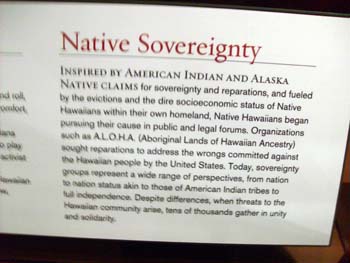 |
| From Linda's and Evelin's cameras We re-visited the Iolani Palace where we had witnessed the chanting on Day Two. See also many pictures of trees in the palace park further down. In the park, we visited the site of the first royal mausoleum and crypt built in 1825 to house the remains of King Kamehameha II and Queen Kamamalu, who died in England in July 1824. This site was used as a royal tomb until 1865. On the other side of the road is the statue of Kinng Kamehameha I. At the end of our day we visited the Bishop Museum. Please click on the picture above or here to see more photos! |
Day Eight, 27th August 2009, exploring O'ahu, Linda, Rick, and Evelin |
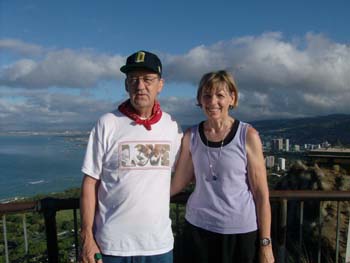 |
| From Linda's camera Linda and Rick climbed Diamond Head in the early morning Please click on the picture above or here to see more photos! |
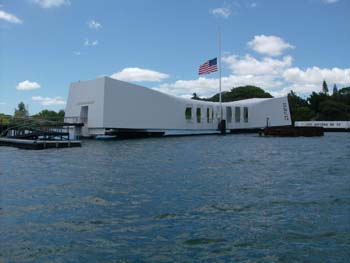 |
| From Linda's and Evelin's cameras Pearl Harbour: this is a place where the tragedies entailed in the Security Dilemma becomes painfully visible. Please click on the picture above or here to see more photos! |
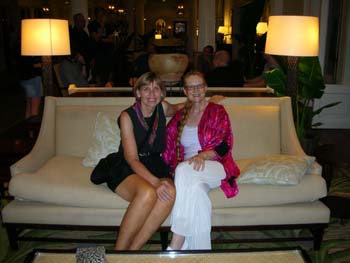 |
| From Linda's and Evelin's cameras Linda, Rick, and Evelin "claiming commons"! Waikiki, Royal Hawai'ian and Moana Surfrider Hotel, where we saw the artist Makana! Please click on the picture above or here to see more photos! |
Day Nine, 28th August 2009, exploring Maui, Linda, Rick, and Evelin |
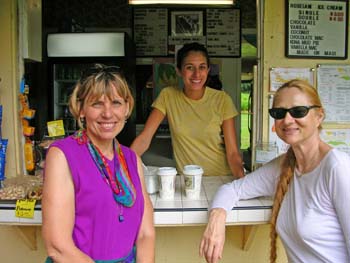 |
| From Linda's and Evelin's cameras With Napua in Keanae, Maui, after we have given up trying to reach Hana! Please click on the picture above or here to see more photos! |
Day Ten, 29th August 2009, exploring Maui, Linda, Rick, and Evelin |
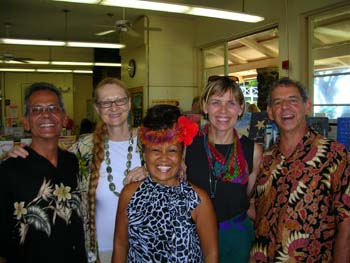 |
From Linda's and Evelin's cameras |
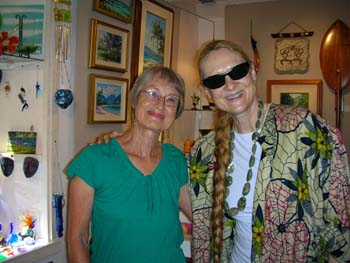  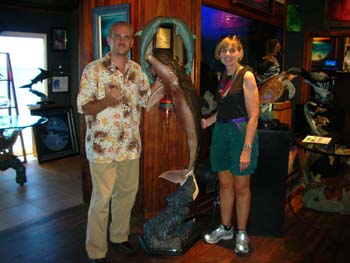 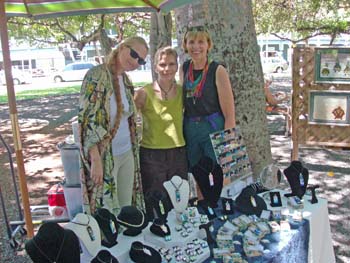 |
From Linda's and Evelin's cameras |
19th August 2009, "Day Zero," Linda, Rick, Stephanie, and Evelin |
 |
| From Evelin's camera Please click on the picture above or here to see more photos! |
|
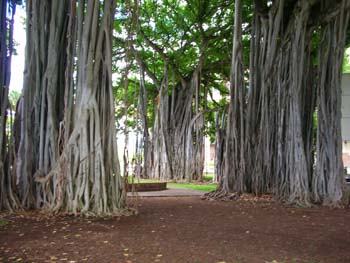  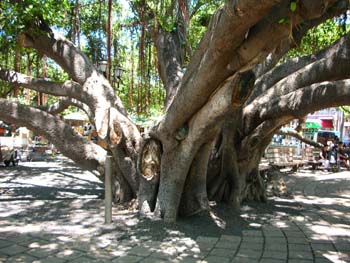 |
| The trees of Hawai'i: trees live in communities - their roots are intertwined and sometimes these roots are visible! Please click on the picture above or here to see more photos from Linda's and Evelin's cameras! |
|
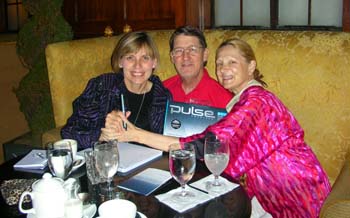 |
| September 5, 2009, Linda, Rick, and Evelin celebrate six amazing weeks together! In five weeks we lived through and experienced: 2 conferences (Hollyhock and Honolulu), 6 islands in 2 countries, 7 ferries/boats, 4 flights, 4 cars, 8 lodgings, 1,25 palaces, 1 princess... Please click on the picture above or here to see more photos! |
Frame
by Linda M. Hartling, 2004, Ph.D., HumanDHS Director, and affiliated with the Jean Baker Miller Training Institute, Wellesley College, Boston, USA
In our conferences we aim at creating a humiliation-free, collaborative learning environment characterized by mutual respect, mutual empathy, and openness to difference. The perspective of "appreciative enquiry" is a useful frame of our work. Our HumanDHS efforts are not just about the work we do together, but also about HOW WE WORK TOGETHER. At appropriate points during our conferences, for example at the end of each day, we take a moment to reflect on the practices observed that contributed to an appreciative/humiliation-free learning experience.
It is important to emphasize that an appreciative approach is not about expecting people to agree. In fact, differences of opinion enrich the conversation and deepen people's understanding of ideas. Perhaps, this could be conceptualized as "waging good conflict" (Jean Baker Miller), which means practicing radical respect for differences and being open to a variety of perspectives and engaging others without contempt or rankism. As we have seen in many fields, contempt and rankism drain energy away from the important work that needs to be done. Most people only know "conflict" as a form of war within a win/lose frame. "Waging good conflict," on the other side, is about being empathic and respectful, making room for authenticity, creating clarity, and growth.
Please read An Appreciative Frame: Beginning a Dialogue on Human Dignity and Humiliation, that Linda has written for us in 2005.
Please see also Appreciative Facilitation: Hints for Round Table Moderators, kindly written in February 2006 by Judith Thompson to support the moderators of our workshops.
Please see furthermore Buddhist Teachings on Right Speech, kindly provided to us by Thomas Daffern in 2006, relating to our quest for appreciative enquiry, caring and being.
• Green Conference
Lynn King kindly advises us how to organize a "Green Conference"
• Please kindly note that...
• There is no registration fee for our conferences. To cover our expenses, we always summarise the costs during the conference and invite participants to contribute according to their ability. This collaborative approach to financing allows us to keep the conference affordable for all.
• We like to get to know participants prior to our conferences and workshops, and prior to issuing an invitation.
• All our gatherings are by invitation only, please approach us so that we can include you and register you.
Only our Public Events are open to everybody without registration.
• The Non-Public Parts of our gatherings have limited enrollment.
• Participants are encouraged to find their own sources of funding or economic support to participate in our conferences. We offer our nurturing work as our gift of love and care to you, and we
would like to lovingly invite everybody to contribute to this gift economy. If you need funding for your travels and housing, please inquire in your country and your university about possibilities. See, among others, for the US, www.supportcenter.org and www.foundationscenter.org. The Weinstein International Fellowship program, inaugurated in 2008, provides opportunities for individuals from outside the United States to visit the U.S. to learn more about dispute resolution processes and practices and to pursue a project of their own design that serves to advance the resolution of disputes in their home countries.
• Participants in our conferences are kindly asked to handle all of their travel arrangements and required documentation, including requests for visas, on their side. HumanDHS is a volunteer initiative and does not have the staff or resources to assist with visa requests.
• Permissions
During our conferences, we always ask all participants for their permission to have their pictures or videos posted on our website, however, if you change your mind later, either in total or for specific pictures/videos, please let us know! Thank you! Since we wish to walk the talk of dignity, it is very important for us to do our utmost in respecting everybody's privacy. We refrain from gathering written permissions from you during our conferences, since we value the building of mutual trust in relationships, and we also would like to refrain from contributing to an ever more bureaucratic and legalistic society.
• What Happened in Our Previous Conferences?
Please have a look at all our previous conferences and at the newsletters written after these conferences! See newsletter Nr. 12, compiled subsequent to the 2008 workshop.
List of Conveners
Evelin Gerda Lindner, Medical Doctor, Clinical and Social Psychologist, Ph.D. (Dr. med.), Ph.D. (Dr. psychol.), Organiser of the HumanDHS Conferences, Supporting the Local Conveners
Evelin G. Lindner is the Founding President of Human Dignity and Humiliation Studies (HumanDHS). She is a transdisciplinary social scientist, and recipient of the 2006 SBAP Award and 2009 "Prisoner’s Testament" Peace Award, affiliated first with the Columbia University Conflict Resolution Network (CU-CRN), which was superseded, in 2009, by the Advanced Consortium on Cooperation, Conflict, and Complexity (AC4) at Columbia University, New York, with the University of Oslo, Norway, Department of Psychology (folk.uio.no/evelinl/), and with the Maison des Sciences de l'Homme, Paris. Lindner is teaching globally, including in South East Asia, the Middle East, Australia, Africa, and other places globally. [read more]
Linda M. Hartling, Ph.D., Social Psychologist, Organiser of the HumanDHS Conferences, Supporting the Local Conveners
Dr. Linda M. Hartling is the Director of Human Dignity and Humiliation Studies (HumanDHS). She is also a Member of the HumanDHS Global Advisory Board, HumanDHS Global Core Team, HumanDHS Global Coordinating Team, HumanDHS Research Team, and HumanDHS Education Team. She is the Editor of the Journal of Human Dignity and Humiliation Studies (JHDHS).
Hartling is affiliated with the Jean Baker Miller Training Institute (JBMTI) at the Stone Center, which is part of the Wellesley Centers for Women at Wellesley College in Massachusetts.
Until November 2008, she was its Associate Director. Hartling is a member of the JBMTI theory-building group advancing the practice of the Relational-Cultural Theory, which is a new model of psychological development. In addition, Hartling coordinates and contributes to training programs, publications, and special projects for the JBMTI. She holds a doctoral degree in clinical/community psychology and has published papers on resilience, substance abuse prevention, shame and humiliation, relational practice in the workplace, and Relational-Cultural Theory. [read more]
Please see:
• Humiliation: Real Pain, A Pathway to Violence, the draft of Linda's paper for Round Table 2 of our 2005 Workshop on Humiliation and Violent Conflict, Columbia University, New York.
• Humiliation: Assessing the Impact of Derision, Degradation, and Debasement, first published in The Journal of Primary Prevention, 19(4): 259-278, co-authored with T. Luchetta, 1999.
• Shame and Humiliation: From Isolation to Relational Transformation, the Jean Baker Miller Training Institute (JBMIT), Wellesley Centers for Women, Wellesley College No. 88, Wellesley, MA 02481, co-authored with Wendy Rosen, Maureen Walker, Judith V. Jordan, 2000.
• Humiliation and Assistance: Telling the Truth About Power, Telling a New Story, paper prepared for the 5th Annual Conference of Human Dignity and Humiliation Studies 'Beyond
Dharm P. S. Bhawuk, Ph.D., Host, Organizer and Convener
Dr. Dharm P. S. Bhawuk is a Member in the HumanDHS Global Advisory Board, the HumanDHS Global Core Team, and the Director and Coordinator of HumanDHS's World Films for Equal Dignity Project.
Dr. Dharm P. S. Bhawuk, a Citizen of Nepal, is Professor of Management and Culture and Community Psychology, Shidler College of Business, University of Hawai'i at Manoa, Honolulu. He received his Ph.D. in Human Resource Management from the University of Illinois at Urbana-Champaign. [...] Professor Bhawuk is a Founding Fellow of the International Academy of Intercultural Research, and the recipient of Distinguished Scholar Award, Management Department, College of Business Administration (2000), the Best Paper Award from the International Division of the Academy of Management (1996), the Distinguished Service Award from the East West Center (1989), and the Lum Yip Kee Outstanding MBA Student Award from the College of Business Administration, University of Hawai'i (1990). [read more]
For more information see:
• O'ahu: www.visit-oahu.com.
• The IAIR conference: www.interculturalacademy.org and www.uhh.Hawai'i.edu/~iair/Conference_IAIR_2009/.
• Housing: Professor Bhawuk reserved rooms in the Lincoln Hall on campus, 7 minutes walk from our conference venue at Shidler College (about $60 per night per person, contact Housing@EastWestCenter.org), which had to be booked before June 15 via the East West Center. Professor Bhawuk had also reserved rooms in the Ala Moana Hotel (about $100 per night per person).
• Meals: There are several cafeteria's and cafes on campus. We had Indian food made by Gokul on Day Two and Day Three, which was wonderful! Thank you dear Gokul! His telephone number is +1 808 285 4246,
and his email ramayan44[@]hotmail.com.
20th-22nd August 2009: Program - Closed Part of the Conference
Day One, 20th August 2009
8.00-9.00 Registration
9.00-9.40 Dharm P. S. Bhawuk and Linda Hartling welcomed everybody to the closed part of our conference and explained our appreciative frame
Linda M. Hartling usually welcomes everyody and sets the frame of our conferences within "Appreciative Enquiry" (until his sad passing in 2007, she did this together with Donald Klein). Please read An Appreciative Frame: Beginning a Dialogue on Human Dignity and Humiliation, that Linda has written for us in 2005.
Linda keeps our workshops together with her continuous caring interventions and her wisdom carries our conferences through crucial moments.
Click on this picture or here to see more photos of Day One from Evelin's camera
9.40-10.30 Participants presented themselves
10.45-12.00 Introductory Presentation: How We Are and Our Latest News
Linda M. Hartling, Ph.D., Director of HumanDHS. She is also a Member of the HumanDHS Global Advisory Board, HumanDHS Global Core Team, HumanDHS Global Coordinating Team, HumanDHS Research Team, and HumanDHS Education Team. She is the Editor of the Journal of Human Dignity and Humiliation Studies (JHDHS).
Linda is affiliated with the Jean Baker Miller Training Institute (JBMTI) at the Stone Center, which is part of the Wellesley Centers for Women at Wellesley College in Massachusetts. Until 2008, she was its Associate Director.
See here the latest news of our HumanDHS network!
Evelin G. Lindner, Founding President of HumanDHS
This talk highlights how globalization is interlinked with new and unprecedented psychological dynamics that call for novel solutions at all levels - macro, meso and micro levels, and in all fields of public policy.
Please see background material: In Times of Globalization and Human Rights: Does Humiliation Become the Most Disruptive Force? In: Journal of Human Dignity and Humiliation Studies, Volume 1, Number 1, March 2007.
Please see an earlier version here or at http://ssrn.com/abstract=668742 (this paper's SSRN ID is 668742)
See also The World on a Trajectory from Humiliation to Dignity: A List of “Factoids,” paper prepared for this conference.
See, furthermore, Dignity or Humiliation in Economic and Monetary Systems: Can We “Occupy Wall Street” and Transcend the Old Cs (Communism and Capitalism) through Economic Systems of True Inclusion? What about Inclusionism? Or Dignism?.
12.00-13.30 Lunch
13.30-15.00 Open Space Session 1 (15 minutes each)
Our Open Space was facilitated by Linda M. Hartling. Please read here more about the Open Space and what it entails.
• The Role of Human Dignity in Promoting Creativity, Knowledge and Peace: Humiliation as a Basis for Dehumanization, Conflict and Destruction by Uichol Kim
Paper presented at the 13th Annual Conference of Human Dignity and Humiliation Studies "World Peace through Humiliation-Free Global Human Interactions," in Honolulu, Hawai'i, August 20 to 23, 2009.
Click on this picture or here to see more photos of Day One from Evelin's camera• Are Global Dignity, Humiliation-Free, Nonkilling Societies Possible? by Glenn Durland Paige, supported by George Kent. Please see Paige, G. D. (2009). Nonkilling Global Political Science. Revised Edition. Honolulu, HI: Center for Global Nonkilling, available at http://www.nonkilling.org/pdf/nkgps.pdf.
Click on this picture or here to see more photos of Day One from Evelin's camera• Respect and International Relations: State Motives, Social Mechanisms and Hypotheses by Reinhard Wolf
Abstract prepared for the 13th Annual Conference of Human Dignity and Humiliation Studies "World Peace through Humiliation-Free Global Human Interactions," in Honolulu, Hawai'i, August 20 to 23, 2009.
Click on this picture or here to see more photos of Day One from Evelin's camera• The Role of Dignity and Humiliation for Ethnic Conflict by Rosita Albert
Click on this picture or here to see more photos of Day One from Evelin's camera
15.00-16.30 Nation Within: The Story of America’s Annexation of Hawai'i (1999)
Tom Coffman, writer & producer; Joy Chong-Stannard, director, Kaneohe, Hawai'i, shown by Dharm P. S. Bhawuk, Professor of Management and Culture and Community Psychology, Shidler College of Business, University of Hawai'i, Manoa, Honolulu
See also a book excerpt from Tom Coffman's book Nation Within: The Story of America's Annexation of the Nation of Hawaii (Kenmore, WA: Epicenter, 2003).
16.30 End of Day One
Francisco Gomes de Matos sent us this message (August 14, 2009):
Dear Linda and Evelin,
Thank you for sharing the inspiring Program.I´ll be there...spiritually, sharing the action in the Hawai'i Conference. In your message, you speak of the Dignifying of Conferences,... well, here is a little tribute to the participants:
ON DIGNIFYING A CONFERENCE
By Francisco Gomes de Matos, a peace linguist from Recife, Brazil. A member of
the HDHS Family
A Conference we dignify
when one another we respect
A Conference we dignity
when we interact with affect
A Conference we dignify
when we express our appreciation
A Conference we dignify
when we always seek conciliation
A Conference we dignify
when Humilitation we deplore
A Conference we dignify
when Humanization we explore
A Conference we dignify
when Planetary Peace we elevate
A Conference we dignify
When Nonkilling we also advocate
A Conference we dignify
when the need for socio- economic justice we emphasize
A Conference we dignify
when the diversity of languages-cultures we recognize
Day Two, 21st August 2009
9:00 Welcome
9.30 - 10.45 Relational-Cultural Theory: The Role of Dignity and Humiliation
Linda M. Hartling, Director of HumanDHS
Linda is affiliated with the Jean Baker Miller Training Institute (JBMTI) at the Stone Center, which is part of the Wellesley Centers for Women at Wellesley College in Massachusetts. Until 2008, she was its Associate Director. Dr. Hartling is a member of the JBMTI theory-building group advancing the practice of the Relational-Cultural Theory, which is a new model of psychological development. In addition, Dr. Hartling coordinates and contributes to training programs, publications, and special projects for the JBMTI. She holds a doctoral degree in clinical/community psychology and has published papers on resilience, substance abuse prevention, shame and humiliation, relational practice in the workplace, and Relational-Cultural Theory.


Click on this picture or here to see more photos of Day Two from Evelin's camera
Quantum Peace
Exploring a New Paradigm for Peace-Building
Victoria C. Fontan, Member of the HumanDHS Board of Directors
Victoria is the Director of Academic Development, and Assistant Professor of Peace and Conflict Studies at the United Nations-mandated University for Peace in San Jose, Costa Rica. As a Fellow to the Iraq Project at the CICR in Columbia University, Victoria is in charge of developing a permanent Conflict Resolution curriculum in northern Iraqi universities.
Click on this picture or here to see more photos of Day Two from Evelin's camera
11.00-12.00 Musical performance introduced by Kristabelle Munson
Our thanks go to Kristabelle Munson. She brought to the Mahalohalo Kolintang Ensemble: Wayland Quintero, Desiree A. Seguritan, Leila Lagundino, and Bernard Ellorin (see here his teacher's website).





Click on this picture or here to see more photos of Day Two from Evelin's camera
12.00-13.30 Lunch
13.30-16.30 Open Space Session 2 (15 minutes each)
• On the Child's Right to Identity, the Best Interests of the Child and Human Dignity by Ya'ir Ronen
Abstract prepared for the 13th Annual Conference of Human Dignity and Humiliation Studies "World Peace through Humiliation-Free Global Human Interactions," in Honolulu, Hawai'i, August 20 to 23, 2009.
Click on this picture or here to see more photos of Day Two from Evelin's camera• The Humiliation of Hunger by George Kent
Paper prepared for the 13th Annual Conference of Human Dignity and Humiliation Studies "World Peace through Humiliation-Free Global Human Interactions," in Honolulu, Hawai'i, August 20 to 23, 2009.
George kindly illustrates this topic with an example (December 21, 2008): "In India there have been huge numbers of suicides of small-scale farmers, mainly because they have not been able to keep up with their debts and feed their families."
See also :
- Swaraj Against Hunger (2009, draft of August 9)
Basis for recent talks in India, in Kota, Jaipur, and New Delhi
Click on this picture or here to see more photos of Day Two from Evelin's camera• The Folk Concept of Respect by Werner Schirmer
Co-authored with Wendelin Reich, and Linda Hamann (2009), Unpublished working paper, Department of Sociology, Uppsala University, Sweden: Paper presented the 13th Annual Conference of Human Dignity and Humiliation Studies "World Peace through Humiliation-Free Global Human Interactions," in Honolulu, Hawai'i, August 20 to 23, 2009.
- See also:
A Theory of Respect
Co-authored with Wendelin Reich (2009), Unpublished working paper, Department of Sociology, Uppsala University, Sweden: Work in progress, a shortened version of this manuscript will be presented in the Theory Section at the The American Sociological Association conference in San Francisco in August 2009.

Click on this picture or here to see more photos of Day Two from Evelin's camera• "BE the Arrow!" by Stephanie Heuer
Click on this picture or here to see more photos of Day Two from Evelin's camera• Reflections on Dignity and Humiliation for Teacher Students by Moira Rogers
Click on this picture or here to see more photos of Day Two from Evelin's camera• Reflections on the HumanDHS network by Kristabelle Munson
Click on this picture or here to see more photos of Day Two from Evelin's camera
16.30 End of Day Two
Fiftieth anniversay of President Dwight D. Eisenhower signing the Proclamation for Hawai'i to become a State of the United States
Our conference took place at a very important historical point in time: The 21st of August 2009 (Day Two of our conference) marked the fiftieth anniversay of President Dwight D. Eisenhower signing the Proclamation for Hawai'i to become a State of the United States. This is a controversial anniversary, because the native Hawai'ians consider the annexation an illegal overthrow of their monarchy. This is another example of anniversary celebrations being perceived as profoundly humiliating by those who were disenfranchized. Please see for more information, among others, Hawai'i Pono'ī -The People Who Love the Land. Through Kristabelle Munson, we had the unexpected privilege of witnessing the solemn chanting marking the date of this humiliation. and meeting with Yuklin Aluli, Attorney at Law, on the right side with Kau'i N. Burgess, both part of Hawai'i Pono'ī Coalition. On their website we read: "Hawai'i Pono'ī is the title of Hawai'i national anthem written by King Kalākauwa in 1874. Literally translated "Hawai'i's own," Hawai'i Pono'ī connects us to the history of the Islands and the heritage of its Indigenous people, a heritage that enriches us all. The Hawai'i Pono'ī Coalition was formed to educate those who live in and visit the Islands about Hawai'i's true history, the Native Hawai'ian people, and the culture that makes Hawai'i a place like no other.
Kristabelle also made us aware of the Hawai'ian renaissance and of singers such as Gabby Pahinui.

Click on this picture or here to see more photos of Day Two from Linda's camera; the picture on the left side is with Yuklin Aluli, Attorney at Law, on the right side with Kau'i N. Burgess
Day Three, 22nd August 2009
9:00 Welcome
9.30-15.00 Open Space Session 3
• Humiliation and the First Day of Kindergarden by Grace Feuerverger
Click on this picture or here to see more photos of Day Three from Evelin's camera• World Government by Garry Davis
Click on this picture or here to see more photos of Day Three from Evelin's camera• Reflections and Questions in Connection with the Introductory Talk on Humiliation by Evelin Lindner
• Reflections and Questions: Humiliation of Hunger by George Kent
Click on this picture or here to see more photos of Day Three from Evelin's camera• Forgiveness by Stephanie Heuer
Click on this picture or here to see more photos of Day Three from Evelin's camera• The Concept of Human Dignity and Uncertainty by Victoria C. Fontan
Click on this picture or here to see more photos of Day Three from Evelin's camera• Dignifying Economic Systems – Money As Debt by Dharm P. S. Bhawuk and Paul Grignon
12.00-13.30 Lunch (in between)
15.00 - 16.00 Closing comments and appreciative reflections


Click on this picture or here to see more photos of Day Three from Evelin's camera. We thank Karen Cross and Katherine Li for joining us and apologize for thinking that we could cancel our Public Event!
16.00 End of Day Three
Day Four, 23rd August 2009
We went on a Sightseeing Road Trip with Kristabelle Munson
Click on this picture or here to see more photos of Day Four from Evelin's camera
Click on this picture or here to see more photos of Day Four from Linda's camera
List of Participants
• Uichol Kim
The Role of Human Dignity in Promoting Creativity, Knowledge and Peace: Humiliation as a Basis for Dehumanization, Conflict and Destruction
Paper presented at the 13th Annual Conference of Human Dignity and Humiliation Studies "World Peace through Humiliation-Free Global Human Interactions," in Honolulu, Hawai'i, August 20 to 23, 2009.
• Reinhard Wolf
Respect and International Relations: State Motives, Social Mechanisms and Hypotheses
Abstract prepared for the 13th Annual Conference of Human Dignity and Humiliation Studies "World Peace through Humiliation-Free Global Human Interactions," in Honolulu, Hawai'i, August 20 to 23, 2009.
• Werner Schirmer
The Folk Concept of Respect
Co-authored with Wendelin Reich, and Linda Hamann (2009), Unpublished working paper, Department of Sociology, Uppsala University, Sweden: Paper presented at the 13th Annual Conference of Human Dignity and Humiliation Studies "World Peace through Humiliation-Free Global Human Interactions," in Honolulu, Hawai'i, August 20 to 23, 2009.
- See also:
A Theory of Respect
Co-authored with Wendelin Reich (2009), Unpublished working paper, Department of Sociology, Uppsala University, Sweden: Work in progress, a shortened version of this manuscript will be presented in the Theory Section at the The American Sociological Association conference in San Francisco in August 2009.
• Grace Feuerverger
On the Child's Right to Identity, the Best Interests of the Child and Human Dignity
An Excerpt from Chapter Three of Teaching, Learning and Other Miracles (2007, Rotterdam: Sense), “What I learned from my first day of Kindergarten” presented at the 13th Annual Conference of Human Dignity and Humiliation Studies "World Peace through Humiliation-Free Global Human Interactions," in Honolulu, Hawai'i, August 20 to 23, 2009.
• George Kent
The Humiliation of Hunger
Paper prepared for the 13th Annual Conference of Human Dignity and Humiliation Studies "World Peace through Humiliation-Free Global Human Interactions," in Honolulu, Hawai'i, August 20 to 23, 2009.
See also :
- Swaraj Against Hunger (2009, draft of August 9)
Basis for recent talks in India, in Kota, Jaipur, and New Delhi
• Glenn D. Paige, Professor Emeritus of Political Science, University of Hawai‘i, and Chair of the Governing Council, Center for Gobal Nonkilling. Please see: Paige, G. D. (2009). Nonkilling Global Political Science. Revised Edition. Honolulu, HI: Center for Global Nonkilling, available at http://www.nonkilling.org/pdf/nkgps.pdf.
• Ya'ir Ronen
On the Child's Right to Identity, the Best Interests of the Child and Human Dignity
Abstract prepared for the 13th Annual Conference of Human Dignity and Humiliation Studies "World Peace through Humiliation-Free Global Human Interactions," in Honolulu, Hawai'i, August 20 to 23, 2009.
• Joám Evans Pim and Francisco Gomes de Matos are with us in spirit
• Stephanie Heuer
HumanDignity for Children: Finding a Voice for Dignity
• Garry Davis, Former US Presidential Candidate, and peace activist who created the first "World Passport." A former World War II bomber pilot and Broadway actor, he renounced his American citizenship in Paris in 1948 to become a "citizen of the world." Davis founded the World Service Authority, which now issues the passports - along with birth and other certificates - to applicants. Davis first used his "world passport" on a trip to India in 1956, and has been variably admitted into or jailed by countries around the world after using his world passport. Up to 150 countries have purportedly accepted the world passport at one time or another. In France, his support committee was co-founded by writers Albert Camus and André Gide and the Abbé Pierre (quoted from wikipedia). Garry can be watched under the story tab at www.onefilms.com.
• Karen Cross, Co-Director of the Center for Global Nonkilling, Hawai‘i. Her primary responsibility lies in overseeing organizational operations, fund-raising and partnership development, assisting Team Leaders and leading specific projects. Karen managed the academic, research, and service work of the multidisciplinary Program on Conflict Resolution and Matsunaga Institute for Peace at the University of Hawai`i for over 22 years. She provides culturally appropriate process design, facilitation, mediation, public policy dialogues, and conflict resolution training to organizations and agencies throughout the community, state and internationally
• Katherine Li, Research Team Leader of the Center for Global Nonkilling, Hawai‘i. Katherine's primary responsibility lies in identifying, leading and/or overseeing research initiatives, including symposia, collection of critical data related to nonkilling, research committees and related activities. Katherine has conducted extensive research on nonkilling and related issues. Recently, she compiled an annotated bibliography and summary of more than 1400 doctoral dissertations related in some way to nonkilling. Her research interests also include Global Citizen Education and Conflict Transformation. She has a BA in Asian Studies from the University of Hawai'i and an MA in International and Comparative Education from the Department of Transcultural Studies at Teachers College, Columbia University.
• The Mahalohalo Kolintang Ensemble with Wayland Quintero and his wife Desiree A. Seguritan, together with Leila Lagundino and Bernard Ellorin (see here his teacher's website).
They could unfortunately not join us:
• Jacqueline Howell Wasilewski
• Neil Ryan Walsh (Neil is unfortunately hindered to join us)
• Anne Brown, Research Fellow, The Australian Centre for Peace and Conflict Studies, The University of Queensland, Brisbane, Australia
•Marga Jann, AIA, RIBA, NCARB, Adjunct Assoiate Professor, University of Hawai’i at Manoa School of Architecture, Principal, Poetic License, World Association of International Studies, Stanford University, Architects Without Borders, Fellow, Cambridge European Society
Philanthropic Architecture: Nongovernmental Development Projects in Latin America
Co-authored with Stephen Platt (2009)
Essay for the 13th Annual Conference of Human Dignity and Humiliation Studies "World Peace through Humiliation-Free Global Human Interactions," in Honolulu, Hawai'i, August 20 to 23, 2009.
• Dakshinamoorthi Raja Ganesan
• Bertram and Anne Wyatt-Brown
• Michiko Kuroda, United Nations
• Kathryn Crawford
• Rashani
See her poem Song of Hope
Open Space and What It Entails
Donald Klein explained the Open Space design as follows (2006): It involves creating a kind of 'marketplace' of possibilities based on topics nominated by participants. The only requirement is that whoever nominates the topic, acts as the convener of the discussion of the topic and takes responsibility for having notes taken. A report is subsequently made about the essence of what was discussed, including any conclusions or recommendations, at a plenary session following the topic groups.
The Open Space design has the advantage of focussing on whatever is of greatest interest to participants at the moment. It allows for parallel discussion of multiple topics, followed by a period of sharing and general discussion.
Alan Klein kindly wrote (31/10/2005): One of the key elements in making an OS event successful is the focusing of the question that the participants respond to. Another is being clear about what will be done with the information presented and/or decisions made in the OS event itself.
I would like you all (and any others who should be involved in this as well) to begin thinking and dialoguing about what would be the most question that you would most like to see grappled with by the participants. This may or may not include a sense of the decision(s), or type of decision(s) that you want the participants to come to or you may decide that the OS event is just for gathering and focusing energy and not to some to any decisions.
Thanks,
~Alan
On 14th December, 2005, we had a Board Meeting in NY:
We discussed our Open Space Section. Don explained that we could have different levels, a more open and general level and a more focused level. At the more open level we would discuss what is on our minds, at the more focused level, we would form 'buzzgroups' on particular topics, such as business, research, education, fundraising, non-profit.
Don Klein kindly wrote (30/12/2005):
[...] The main point I recall dwelling on at some length had to do with deciding first on the content of a session and its purpose; then deciding what meeting technology to use. Open Space is often used when the purpose is to make it possible for individuals to focus on aspects of a general topic that are of special interest to them. The participants themselves choose what they want to discuss. No one knows in advance how many groups there will be and what they'll be discussing.
Buzz groups are used as a way to break a large meeting down into smaller sections (usually from six to twelve or so people). All the buzz groups can be assigned the same topic; or different buzz groups can be assigned different aspects of the same topic; or buzz groups may be divided among two or more different - usually related - topics.
The main point is to decide what is to be the topical focus and what outcomes are desired from a session. Then pick the technique that promises to help us achieve the purpose.
Love, Don
Sophie Schaarschmidt kindly wrote (02/01/2006):
What I would suggest for a following workshop (and this is my very personal view) is to create discussion forums as open choices. The open space technology as I know it, and as it is used mainly in the field of training involves participants in a unique way. The first step is like an open brainstorm session involving all participants. In this session, participants can come up with a topic that they want to (present and) discuss. All topics are written down and similar topics might be combined into one topic. This process can happen either beforehand via email or a web-forum or at the workshop on a blackboard. Once the discussion topics are defined the person that proposed a certain topic would announce a time and a space when and where the topic will be discussed. In a full day of open-space, up to 50 topics could be discussed. People are free to join and leave a discussion. As a metaphor, people are like bees flying from one topic to another, participating in a discussion as long as it feeds their interest and taking the honey from it as well as contributing to it, and leaving the discussion when it takes a turn into a direction that they are less interested in or when they wish to participate in other discussions on other topics as well. Normally people take part in 3 to 10 discussions a day. Therefore, people are free to select the topics they are interested in and move to other discussions, as listener or both, listener and contributor. Each discussion group is also free in putting their time frame, and scheduling breaks. Of course, there should be a time frame for the open-space session, let's say it would take place from 1pm to 5pm in the afternoon. Yet, discussion groups can schedule their space (location), time frame (a discussion could last half an hour or three hours: as much as it takes to explore the issue) and breaks themselves. The only condition is that the discussion topic, its location and starting time will be announced (or written down on a public board) so that all participants know when which subject will be discussed where.
I participated twice in such an open-space session and I was very much impressed by its power and evolving possibilities. Not only were people more active, excited and engaged, taking little breaks, but also people felt they could gain and contribute most in this process. They felt they were free to choose which discussions to engage in, and it was an easy way to make contacts with those people interested and engaged in topics similar to one's own. By being able to set an own time frame discussions were deeper than usual, and by participants moving from one topic to another, joining (and making new contributions) or leaving a discussion the discussions stayed vivid and interesting, and many perspectives could be shared. At the end of a discussion each group filled in an A4 page which contained the title of the discussion group, a list of the names of the people who contributed in the discussion, and a summary of what was discussed (the main stances). All the discussion summaries can be combined to a book at the end of the conference providing people with a tremendous treasure of topics and insights.
Another advantage of the open-space technology (as I experienced it) is that people stay 'fresh' in the workshop. The discussion excites and revives people and forms a good basis for getting to know each other and going on with the discussions at a later time in the workshop (e.g. during lunch).
It might be worthy to try the open-space technology in a HumanDHS workshop meeting substituting the round table sessions, or in addition to them. The only difficulty I'm aware of might be that we would need many spaces (rooms) where the discussion groups could spread for their discussions.
[...]
Good luck for your work in 2006!
Yours warmly,
Sophie Schaarschmidt
Linda M. Hartling kindly wrote in response to a message from Carlos Sluzki (21/01/2006):
How do we maximize the quality of work together when we are a group of individuals with dramatically varying levels of experience? This is such an important topic I think we should discuss it at our next meeting in Costa Rica. Perhaps, we could use some of our Board meeting time to discuss this? In addition, perhaps we could use some of our 'open space' time to explore people's view of this dilemma? I suspect that all of us involved with the operations of this network share a desire to optimize our efforts, to move the work forward efficiently and effectively. When we use an all-inclusive format at our meetings, we risk back tracking and dealing with questions that have obvious answers (e.g., convincing some newer attendees of the significance humiliating behavior). (...) In the words of Peter Drucker, I would like to see our group create conditions that 'strengthen our effectiveness and make our weaknesses irrelevant'. But, how do we do this in a way that promotes the dignity of all the people who attend our meetings? I'm trying to think of some examples of organizations that do this... perhaps, Linda Stout's Piedmont Peace Project? Not too long ago I read a book entitled, 'The Wisdom of Crowds', which I think is relevant to our questions about inclusion/exclusion. It
describes the conditions for 'wise crowds'. (Surowiecki, J. (2004). The Wisdom of Crowds: Why the Many Are Smarter Than the Few and How Collective Wisdom Shapes Business, Economies, Societies, and Nations. New York: Doubleday.)
Don Klein kindly responded (28/01/2006):
I very much support the focus on where we want to go. Suggest working in interest groups part of the time: i.e., education, research, civic action, global community building. And include a way for groups to emerge around other areas of interest. for that matter, if only one person had an
interest and wanted to develop it further and then share his/her thoughts with us, that might also be possible.
Love, Don
Don Klein kindly wrote (28/01/2006):
I'd like to offer some experiences with the network originally known as National Training Laboratories. This network, begun around 1950, is sstill in existence today; it has changed, however, in ways that seem relevant to the issues raised.
The network originally was a group of 'originators' of theory and practice in the area of group dynamics. Most of them had participated in the discovery of 'sensitivity groups' or the t=group method. After almost a decade, the more experienced people in the network became Fellows, as distinct from ordinary Members of the network. To admit someone to their membership, all the Fellows had to agree that the applicant's credentials merited inclusion in the Fellows. During t his initial period, which lasted about ten years, selected members of the network participated as staff members of two and three-week training programs for the general public, using the t-group method. An enormous amount of theory building took place as faculty spent three or four days preparing each of the training labs. It should be noted that most of the network were academics engaged in one or another of the social sciences, in areas related to democratic participation in social change. They were all motivated by their common passion and some of them felt that the two or three weeks they spent with their colleagues from around the country were the most meaningful and exciting of the entire year.
In the 1960s, questions arose about the suitability of having a 'class' system in the network. The Fellows were seen as an anti-democratic perversion of the ideals and purposes of NTL. And so the Fellows class was discontinued.
At about the same time, financial difficulties led to a reorganization of NTL, which included dissolution of the existing netework and inviting a more diverse group (sex, race, and ethnically) to form a new network. The theory and practice of Organization Development, meanwhile, had emerged and more and more of NTLs network members became engaged in OD practice, while fewer and fewer network members were engaged in academic pursuits.
In my view the social impact and creativity of the current network have been reduced by NTL's growing emphasis on operating profitably as a 'business'.
There is currently an upsurge (how strong we don't know) of those wishing to advocate working on participative ways to democratize our institutions and our society. Some of the network members are placing an increased emphasis on creating an international network and of promoting global community.
A major point in all of this history for me is that there is no 'ideal' and certainly no 'absolute' way of resolving questions having to do with competency, interest, and inclusion. Based on the above history, my inclination is to favor the 'class' system; i.s., creating a group of qualified researchers, practitioners, and policy shapers to work together to shape, participate in, and contribute knowledge and skills to the work of HDHS network, including those activities that enable it to raise money by grants, contracts, income from training programs, and contributions.
These comments are lengthy. I hope they're helpful.
Love,
Don
Linda M. Hartling kindly wrote (27/04/2006):
In terms of Open Space...I think we should have some of the same groups we had in Berlin, with room for a couple of new groups. For example, we could have an education group, a research group, a business group, etc. It would be helpful to have these key groups continue their discussions, rather than creating all new groups. Didn't we talk about having 'buzz groups', meaning groups addressing topics that people want to continue to move forward? The education, research, and business groups could be buzz groups.
The following Dignilogue topics were proposed, yet, the facilitators are unable to come. The topics are listed here, because they might inspire you.
• Giving Voices to the Environmentally Humiliated and Misrecognized: Nature and Women by Keitaro Morita (adapted from a similar presentation at the 9th Annual Conference of Human Dignity and Humiliation Studies in Hangzhou, China, 13th-16th April 2007)
• Peace: A World History, by Antony Adolf (2009)
• Native Hawaiian and Polynesian Communities, by Dharm P. S. Bhawuk and Neil Ryan Walsh (Neil was unfortunately hindered to join us) (2009)
• Familiarization and Its Ways: Is Ragging/Bullying an Archaic Method of Interaction, by Harsh Agarwal (2009)
• Humiliation and Dreams, a talk/session by Dakshinamoorthi Raja Ganesan (2009)
• Asian Religious Worldviews and Alienation, and/or Alienation and Dreams, a talk/session by Dakshinamoorthi Raja Ganesan (2009)
• Video Series of the Causes and Patterns of Humiliating Experiences Through Role Play by Dakshinamoorthi Raja Ganesan (2009)
D. Raja Ganesan kindly wrote on January 15, 2009: 'I take this opportunity to suggest that a video series of the causes and patterns of humiliating experiences through role play of well established principles of social psychology--both culture free and culture fair--through role play and simulation be taken under the auspices of our group'.
• Intercultural Research, faciliated by International Academy of Intercultural Research (IAIR) researchers (2009)
Papers
All participants are warmly invited to send in papers.
Please notify us, if you wish to submit any of your papers also as a book chapter or as a journal article.
Please see earlier submitted papers here:
• List of All Publications
Feuerverger, Gracer (2009)
On the Child's Right to Identity, the Best Interests of the Child and Human Dignity
An Excerpt from Chapter Three of Teaching, Learning and Other Miracles (2007, Rotterdam: Sense), “What I learned from my first day of Kindergarten” presented at the 13th Annual Conference of Human Dignity and Humiliation Studies "World Peace through Humiliation-Free Global Human Interactions," in Honolulu, Hawai'i, August 20 to 23, 2009.
Evelin G. Lindner (2009)
Dignity or Humiliation in Economic and Monetary Systems: Can We “Occupy Wall Street” and Transcend the Old Cs (Communism and Capitalism) through Economic Systems of True Inclusion? What about Inclusionism? Or Dignism?
This is a manuscript that has been in progress and has changed almost daily over a period of three years. The first version was presented on August 20, 2009, at the 13th Annual Conference of Human Dignity and Humiliation Studies (HumanDHS) “World Peace through Humiliation-Free Global Human Interactions,” in Honolulu, Hawai’i (August 20-22, 2009), and has been developed further since. This is the last version in form of a paper, dating from October 15, 2011. From October 18, 2011, onward, a book on A Dignity Economy has been developed from this paper.
Lindner, Evelin G. (2009)
The World on a Trajectory from Humiliation to Dignity: A List of “Factoids”
Paper prepared for the 13th Annual Conference of Human Dignity and Humiliation Studies (HumanDHS), in Honolulu, Hawai'i, August 20 to 22, 2009.
Ronen, Ya'ir (2009)
On the Child's Right to Identity, the Best Interests of the Child and Human Dignity
Abstract presented at the 13th Annual Conference of Human Dignity and Humiliation Studies "World Peace through Humiliation-Free Global Human Interactions," in Honolulu, Hawai'i, August 20 to 23, 2009.
Kent, George (2009)
The Humiliation of Hunger
Paper presented at the 13th Annual Conference of Human Dignity and Humiliation Studies "World Peace through Humiliation-Free Global Human Interactions," in Honolulu, Hawai'i, August 20 to 23, 2009.
Kent, George (2009, draft of August 9)
Swaraj Against Hunger
Basis for talks in India, in Kota, Jaipur, and New Delhi in 2009.
Jann, Marga, and Platt, Stephen (2009)
Philanthropic Architecture: Nongovernmental Development Projects in Latin America
Essay for the 13th Annual Conference of Human Dignity and Humiliation Studies "World Peace through Humiliation-Free Global Human Interactions," in Honolulu, Hawai'i, August 20 to 23, 2009.
Reich, Wendelin, Schirmer, Werner, and Hamann, Linda (2009)
The Folk Concept of Respect
Unpublished working paper, Department of Sociology, Uppsala University, Sweden: Paper presented at the 13th Annual Conference of Human Dignity and Humiliation Studies "World Peace through Humiliation-Free Global Human Interactions," in Honolulu, Hawai'i, August 20 to 23, 2009.
- See also:
Reich, Wendelin, and Schirmer, Werner (2009)
A Theory of Respect
Unpublished working paper, Department of Sociology, Uppsala University, Sweden: Work in progress, a shortened version of this manuscript will be presented in the Theory Section at the The American Sociological Association conference in San Francisco in August 2009.
Wolf, Reinhard (2009)
Respect and International Relations: State Motives, Social Mechanisms and Hypotheses
Abstract presented at the 13th Annual Conference of Human Dignity and Humiliation Studies "World Peace through Humiliation-Free Global Human Interactions," in Honolulu, Hawai'i, August 20 to 23, 2009.
Uichol Kim (2009)
The Role of Human Dignity in Promoting Creativity, Knowledge and Peace: Humiliation as a Basis for Dehumanization, Conflict and Destruction
Paper presented at the 13th Annual Conference of Human Dignity and Humiliation Studies "World Peace through Humiliation-Free Global Human Interactions," in Honolulu, Hawai'i, August 20 to 23, 2009.
Material
'126 Years of Illegal US Occupation of Hawai’i', James Albertini | Malu 'Aina Center for Non-violent Education & Action, TRANSCEND Media Service, 21st January 2019.


























